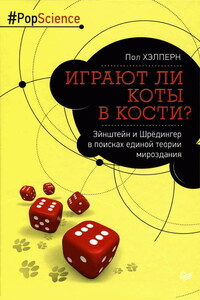Не сдохни! Еда в борьбе за жизнь - [281]
>‹‹37››. Leung AM, LaMar A, He X, Braverman LE, Pearce EN. Iodine status and thyroid function of Boston- area vegetarians and vegans. J Clin Endocrinol Metab. 2011;96(8):E1303–7.
>‹‹38››. Shaikh MG, Anderson JM, Hall SK, Jackson MA. Transient neonatal hypothyroidism due to a maternal vegan diet. J Pediatr Endocrinol Metab. 2003;16(1):111–3.
>‹‹39››. Becker DV, Braverman LE, Delange F, et al. Iodine supplementation for pregnancy and lactation— United States and Canada: recommendations of the American Thyroid Association. Thyroid. 2006;16(10):949–51.
>‹‹40››. Vannice G, Rasmussen H. Position of the Academy of Nutrition and Dietetics: dietary fatty acids for healthy adults. J Acad Nutr Diet. 2014;114(1):136–53.
>‹‹41››. Harris WS. Achieving optimal n-3 fatty acid status: the vegetarian’s challenge…or not. Am J Clin Nutr. 2014;100 Suppl 1:449S–52S.
>‹‹42››. Sarter B, Kelsey KS, Schwartz TA, Harris WS. Blood docosahexaenoic acid and eicosapentaenoic acid in vegans: associations with age and gender and effects of an algal-derived omega-3 fatty acid supplement. Clin Nutr. 2015;34(2):212–8.
>‹‹43››. Bourdon JA, Bazinet TM, Arnason TT, Kimpe LE, Blais JM, White PA. Polychlorinated biphenyls (PCBs) contamination and aryl hydrocarbon receptor (AhR) agonist activity of omega-3 poly-unsaturated fatty acid supplements: implications for daily intake of dioxins and PCBs. Food Chem Toxicol. 2010;48(11):3093–7.
>‹‹44››. Yokoo EM, Valente JG, Grattan L, Schmidt SL, Platt I, Silbergeld EK. Low level methylmercury exposure affects neuropsychological function in adults. Environ Health. 2003;2(1):8.
>‹‹45››. Chang JW, Pai MC, Chen HL, Guo HR, Su HJ, Lee CC. Cognitive function and blood methylmercury in adults living near a deserted chloralkali factory. Environ Res. 2008;108(3):334–9.
>‹‹46››. Masley SC, Masley LV, Gualtierei T. Effect of mercury levels and seafood intake on cognitive function in middle-aged adults. Integr Med. 2012;11(3)32–40.
>‹‹47››. Arterburn LM, Oken HA, Hoffman JP, et al. Bioequivalence of docosahexaenoic acid from different algal oils in capsules and in a DHA-fortified food. Lipids. 2007;42(11):1011–24.
>‹‹48››. Greene J, Ashburn SM, Razzouk L, Smith DA. Fish oils, coronary heart disease, and the environment. Am J Public Health. 2013;103(9):1568–76.
>‹‹49››. Lane K, Derbyshire E, Li W, Brennan C. Bioavailability and potential uses of vegetarian sources of omega-3 fatty acids: a review of the literature. Crit Rev Food Sci Nutr. 2014;54(5):572–9.
>‹‹50››. Witte AV, Kerti L, Hermannstädter HM, et al. Long-chain omega-3 fatty acids improve brain function and structure in older adults. Cereb Cortex. 2014;24(11):3059–68.
>‹‹51››. Farmer B, Larson BT, Fulgoni VL, Rainville AJ, Liepa GU. A vegetarian dietary pattern as a nutrient- dense approach to weight management: an analysis of the National Health and Nutrition Examination Survey 1999–2004. J Am Diet Assoc. 2011;111(6):819–27.
>‹‹52››. Moshfegh A, Goldman J, Cleveland L. What we eat in America, NHANES 2001–2002: usual nutrient intakes from food compared to dietary reference intakes. U.S. Department of Agriculture, Agricultural Research Service 2005.
>‹‹53››. Cogswell ME, Zhang Z, Carriquiry AL, et al. Sodium and potassium intakes among US adults: NHANES 2003–2008. Am J Clin Nutr. 2012;96(3):647–57.
>‹‹54››. Davis B, Melina V. Becoming Vegan: The Complete Guide to Adopting a Plant-Based Diet (Comprehensive Edition). Summertown, TN: Book Publishing Company; 2014.
>‹‹55››. Craig WJ, Mangels AR. Position of the American Dietetic Association: vegetarian diets. J Am Diet Assoc. 2009;109(7):1266–82.
>‹‹56››. Spock B. Good nutrition for kids. Good Medicine. 1998;7(2).

Майкл Грегер – известный врач, лектор, объездивший полмира, автор бестселлеров «Не сдохни! Еда в борьбе за жизнь» и «Не сдохни! 100+ рецептов в борьбе за жизнь». Его лекции «Еда как лекарство», «Больше чем одно яблоко в день» и многие другие были переведены на русский язык и опубликованы на сайте nfrussia.ru. Туберкулез, птичий грипп, СПИД, а теперь и новая коронавирусная пневмония – все эти инфекционные заболевания передались нам от животных. И это плата за научно-технический прогресс и развитие культуры.

В центре романе «Оскомина» известной американской писательницы и сценаристки Норы Эфрон история распада одной благополучной семьи. Рассказывает об этих трагичных для нее событиях главная героиня, и рассказывает остроумно, не жалея ни себя, ни других и перемежая язвительные наблюдения рецептами блюд. Вместе с тем эта история распавшегося брака дает представление о жизни целого слоя людей, чьим родителям стоило такого труда выбиться из нищеты. Их дети теперь путешествуют, гурманствуют, покупают дома и вместе с тем не могут справиться со своими проблемами без помощи психоаналитиков и сеансов групповой терапии. По роману «Оскомина» снят фильм, главные роли в нем исполнили Мерил Стрип и Джек Николсон.

В Петербурге корюшку не называют рыбой. Корюшка — это нечто отдельное и самостоятельное. Ловить и есть весной корюшку — старинная традиция (даже милиция, пресекающая любые посторонние занятия на невских мостах, ловить с них корюшку сетками никому не запрещает). А если вы не любите корюшку, значит, просто не умеете ее готовить. Но не беда, опытный человек сейчас все подробно расскажет.

Книга Натальи Белой «Ешь, готовь, люби» — настоящий психотерапевтический трактат для любителей выпечки и сладкого. Ведь автор утверждает: для того чтобы быть в форме, не обязательно мучиться диетами и запретами. Для красоты и стройности нужно прежде всего любить себя, баловать и прислушиваться к организму, а не считать калории. В основе рецептов — принципы психологии питания: не делаем из еды культ, но подчиняем ее своим целям. Наталья берет всю модную повестку — чизкейк, тирамису, красный бархат, маффины, меренги, хачапури, зерновые булочки, грибной киш — и самым душевным образом адаптирует для любящих здоровое питание.

Корейская кухня, наряду с китайской и японской, приобрела в последнее время особую популярность.Надеемся, что рецепты блюд, представленные в книге, придутся по вкусу вам и вашим близким.

Сыр… Продукт, который человечество знает вот уже несколько тысяч лет! Он является одним из самых любимых и полезных натуральных продуктов. Сыры могут быть разные по происхождению: из коровьего, овечьего, козьего, верблюжьего, буйволиного молока. Особняком стоит богатый белками соевый сыр тофу. Разные по твердости: твердые, полутвердые, полумягкие, мягкие, рассольные, плавленые, копченые, с плесенью… Все они имеют уникальный вкус и по-своему полезны. Практически каждая страна имеет свой, оригинальный рецепт сыра.

Кандидат медицинских наук Юрий Гичев вот уже более 15 лет возглавляет научно-инновационный центр корпорации «Сибирское здоровье». Он является автором более 10 специальных и научно-популярных книг, посвященных вопросам правильного питания и здорового образа жизни. Его новая книга поможет читателю разобраться в том, что правда, а что нет в огромном потоке противоречивой информации о еде. Так ли полезны отрубной батон и тростниковый сахар? Действительно ли микроволновки делают пищу вредной? Стоит ли есть сладкое при подготовке к экзаменам? Много ли витамина C в лимонах? Должна ли колбаса быть розовой? Многочисленные мифы и заблуждения делают нашу и без того не слишком здоровую пищу еще более нездоровой.

Легендарная книга Лоуренса Краусса переведена на 12 языков мира и написана для людей, мало или совсем не знакомых с физикой, чтобы они смогли победить свой страх перед этой наукой. «Страх физики» — живой, непосредственный, непочтительный и увлекательный рассказ обо всем, от кипения воды до основ существования Вселенной. Книга наполнена забавными историями и наглядными примерами, позволяющими разобраться в самых сложных хитросплетениях современных научных теорий.

У каждой эпохи есть своя поворотная точка — возникновение нового взгляда на мир. В этой книге Джейкоб Броновски приглашает вас в путешествие по вершинным достижениям человека, нашей интеллектуальной истории. Первые опыты алхимиков, сложные арифметические выкладки астрономов майя, астрономические часы в Европе, каменные сооружения Мачу-Пикчу и многое другое, что оказывало существенное влияние на развитие человечества, и до сих пор изумляет современных ученых.

Многие физики всю свою жизнь посвящают исследованию конкретных аспектов физического мира и поэтому не видят общей картины. Эйнштейн и Шрёдингер стремились к большему. Поиски привели их к важным открытиям: Эйнштейна — к теории относительности, а Шрёдингера — к волновому уравнению. Раздразненные найденной частью решения, они надеялись завершить дело всей жизни, создав теорию, объясняющую всё.Эта книга рассказывает о двух великих физиках, о «газетной» войне 1947 года, разрушившей их многолетнюю дружбу, о хрупкой природе сотрудничества и открытий в науке.Пол Хэлперн — знаменитый физик и писатель — написал 14 научно-популярных книг.

Мы мечтаем жить вечно. Надеемся, что сможем клонировать любимого домашнего питомца, как это произошло с овечкой Долли. Хотим прогуляться по «парку юрского периода», посмотреть на динозавров и мамонтов, увидеть вымерших моа, дронтов, и других существ.Бет Шапиро – профессор факультета экологии и эволюционной биологии Университета Санта-Круз в Калифорнии – рассказывает нам увлекательную историю современной науки воссоздания видов.Как только любой организм умирает, его ДНК тут же начинает разрушаться под воздействием ультрафиолета и бактерий, поэтому нельзя просто так взять клетку и клонировать вымершее животное.